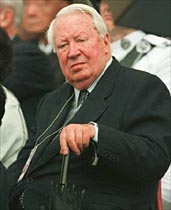 |
|
Born on July 9th, 1916, Edward Heath was the son of a carpenter and builder and was educated at Chatham School, Ramsgate, and Balliol College, Oxford. At university, he was active in Conservative politics and president of the Oxford Union. During World War II, he served in the Royal Artillery.
Heath won the constituency of Bexley for the Conservatives in 1950. His maiden speech concerned European unity, an issue which was to figure prominently in his career. Quickly appointed to the Whips Office, he held the post of Chief Whip from 1955-59, and as such was credited with keeping the parliamentary party together during the Suez Crisis. |
In 1960, Heath was appointed Minister for Labour, and later Lord Privy Seal with responsibility for negotiating EC entry. The Prime Minister, Alec Douglas-Home, subsequently made him President of the Board of Trade. His competence and success there helped Heath's prospects for the leadership, which he won in 1965 at the age of 49. It was then unusual for a Conservative leader not to be upper class, and it was hoped that a middle class leader would change the party's image in the face of the down-to-earth Labour party.
In Opposition, Heath proposed an agenda of trade union reform, tax cuts and spending restraints. As Prime Minister from 1970-74, however, the steep rises in the price of commodities and oil forced the Heath administration to rescue businesses and adopt price and income policies to combat inflation. Heath's term in office also included the deployment of troops to Northern Ireland. One notable achievement was that Heath was able to lead Britain into EC membership, a long-held ambition.
Following a massive strike by coal miners and a forced reduction in UK electricity consumption, Heath and his Cabinet called for a general election, believing that public sympathy would rest with the government. But on February 9, 1974, the Conservatives lost the election to Harold Wilson's Labour Party, despite winning a majority of the vote. A second defeat in October seriously damaged Heath's position. He was defeated in a leadership contest in 1975 by Margaret Thatcher. He has been active in defending One Nation Toryism ever since. He was a fierce critic of the Thatcher government, and continues his vocal opposition to the Eurosceptic wing of the Conservative party in the Commons. He represented Old Bexley & Sidcup in the House of Commons, and was Father of the House from 1992-2001. |

